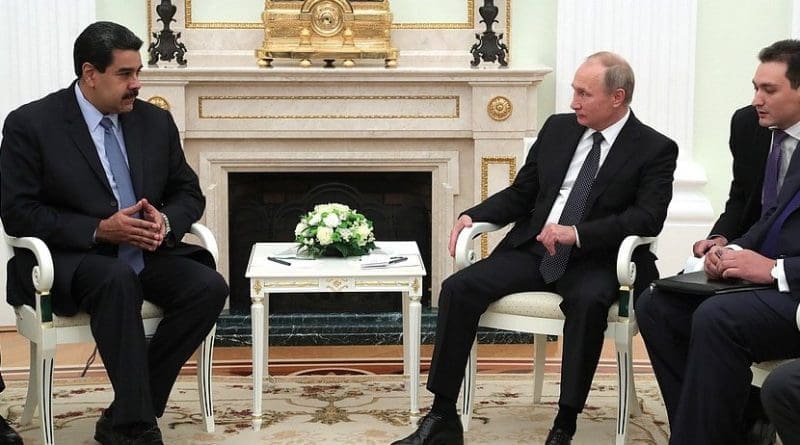Russian Debt Restructuring Keeps Venezuelan Government Afloat – Analysis
By Ross Dayton
On November 8, Russian Finance Minister Anton Siluanov announced that Russia would restructure $3 billion of Venezuela’s debts. Reuters later reported that Russia and Venezuela would sign a deal on November 15 that would restructure Venezuela’s payments for 10 years. While the amount is modest compared to Venezuela’s total foreign debt of $120 billion, it provides some relief for the Venezuelan government to make short-term payments and avoid declaring default.
Venezuelan President Nicolas Maduro announced on November 2 that he wants to restructure and refinance Venezuela’s foreign debts. While Maduro did not explicitly say that the government is going into default, the restructuring announcement signals that Venezuela may not be able to continue making payments in the near future. Despite the country’s ongoing economic crisis, the Venezuelan government has continuously made payments on its foreign debts over the years. On November 9, the Venezuelan state oil company PDVSA managed to pay an overdue principal of $1.1 billion. While the payment shows that the Venezuelan government still intends to continue meeting its foreign debt obligations, PDVSA has still not paid $500 million in interest on the principal payment.
Russia’s Investment in the Venezuelan Government
The Venezuelan government has depended on Russian financial support to remain solvent. The Russian state-owned oil company Rosneft has purchased substantial stakes in five major PDVSA oil projects in exchange for credit and cash. In addition, Rosneft made collateral swaps with Citgo, PDVSA’s US subsidiary, giving it a 49 percent ownership share. The Russian government has provided the Venezuelan government with over $10 billion in financial aid over the past three years. Russia has also sold arms and military equipment to the Venezuelan government; in 2009, Russia gave Venezuela a 2.2 billion loan to purchase tanks and anti-aircraft missiles.
Russia’s investment in the Venezuelan government furthers its own geopolitical interests. Moscow’s financial support directly challenges the United States’ sanction regime, which seeks to isolate Venezuela. Propping up the anti-American Venezuelan government helps undermine US influence in Latin America. Maduro and his predecessor, Hugo Chavez, inspired and supported other anti-American populists throughout the region. The Venezuelan government also courted the US’ global rivals such as Russia, China, and Iran to counter US influence worldwide.
How Russia’s Support Can Backfire
Russian efforts to keep the Venezuelan government financially afloat may not prevail in the long run. Foreign investors are currently unclear as to what the Venezuelan government’s restructuring plans entail. Foreign lenders are unlikely to want to restructure Venezuela’s debt payments due to US sanctions that prevent purchasing government debt or equity. To make matters more complicated, Maduro has appointed his controversial vice president, Tareck El Aissami, to lead the commission in charge of the debt restructuring. Aissami is sanctioned by the US Treasury Department for drug trafficking activities, causing investors to worry about the potential impact of sanctions. Following the restructuring announcement, Fitch downgraded Venezuela’s credit rating from CC to C, citing a high likelihood of default.
It does not appear that Venezuela’s dire economic situation will improve any time soon. While Venezuela holds the largest oil reserves in the world, the glut in global oil prices and economic mismanagement have led to hyperinflation and scarcity of resources such as food and medical supplies. The country’s foreign reserves have dwindled to less than $10 billion for the first time since 1995. The economic crisis has led to widespread protests throughout the country, which the Maduro government has met with violent repression and anti-democratic reforms. Other Latin American governments have condemned Maduro’s actions, and the US implemented sanctions against various government officials and enterprises. Meanwhile, the Venezuelan opposition remains fractured while Maduro continues to consolidate his power via authoritarian measures. As the Venezuelan government becomes further isolated from the international community and financial markets, the costs of Russia’s support may outweigh the benefits.
This article was published at Geopolitical Monitor.com

